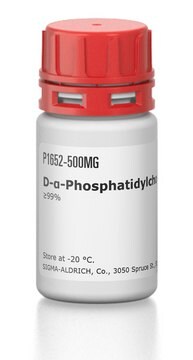850475C
Avanti
18:1-16:0 PC
1-oleoyl-2-palmitoyl-sn-glycero-3-phosphocholine, chloroform
Synonyme(s) :
1--(9Z-octadecenoyl)-2-hexadecanoyl-sn-glycero-3-phosphocholine; OPPC; PC(18:1(9Z)/16:0)
About This Item
Produits recommandés
Pureté
>99% (TLC)
Forme
liquid
Conditionnement
pkg of 1 × 2.5 mL (850475C-25mg)
pkg of 2 × 4 mL (850475C-200mg)
Fabricant/nom de marque
Avanti Research™ - A Croda Brand 850475C
Concentration
10 mg/mL (850475C-25mg)
25 mg/mL (850475C-200mg)
Type de lipide
cardiolipins
phospholipids
Conditions d'expédition
dry ice
Température de stockage
−20°C
InChI
1S/C42H82NO8P/c1-6-8-10-12-14-16-18-20-21-23-24-26-28-30-32-34-41(44)48-38-40(39-50-52(46,47)49-37-36-43(3,4)5)51-42(45)35-33-31-29-27-25-22-19-17-15-13-11-9-7-2/h20-21,40H,6-19,22-39H2,1-5H3/b21-20-/t40-/m1/s1
Clé InChI
RRVPPYNAZJRZFR-VYOBOKEXSA-N
Description générale
Application
- as a lipid standard in ultra-performance liquid chromatography (UPLC) analyses
- as a component in liposomes to study the cell proliferation of several cell lines
- in liposomes for cross-linking experiment
Actions biochimiques/physiologiques
Conditionnement
Informations légales
Mention d'avertissement
Danger
Mentions de danger
Classification des risques
Acute Tox. 3 Inhalation - Acute Tox. 4 Oral - Carc. 2 - Eye Irrit. 2 - Repr. 2 - Skin Irrit. 2 - STOT RE 1 Oral - STOT SE 3
Organes cibles
Liver,Kidney, Respiratory system
Code de la classe de stockage
6.1D - Non-combustible acute toxic Cat.3 / toxic hazardous materials or hazardous materials causing chronic effects
Classe de danger pour l'eau (WGK)
WGK 3
Point d'éclair (°F)
does not flash
Point d'éclair (°C)
does not flash
Certificats d'analyse (COA)
Recherchez un Certificats d'analyse (COA) en saisissant le numéro de lot du produit. Les numéros de lot figurent sur l'étiquette du produit après les mots "Lot" ou "Batch".
Déjà en possession de ce produit ?
Retrouvez la documentation relative aux produits que vous avez récemment achetés dans la Bibliothèque de documents.
Notre équipe de scientifiques dispose d'une expérience dans tous les secteurs de la recherche, notamment en sciences de la vie, science des matériaux, synthèse chimique, chromatographie, analyse et dans de nombreux autres domaines..
Contacter notre Service technique










